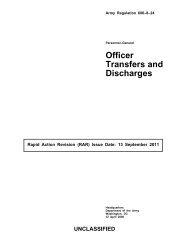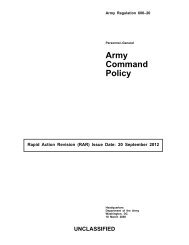Patient Administration - Army Publishing Directorate - U.S. Army
Patient Administration - Army Publishing Directorate - U.S. Army
Patient Administration - Army Publishing Directorate - U.S. Army
Create successful ePaper yourself
Turn your PDF publications into a flip-book with our unique Google optimized e-Paper software.
c. Civilians interned by the <strong>Army</strong>. Such individuals will be provided hospitalization in Armed Forces MTFs only in<br />
the absence of adequate civilian facilities. (See para 3-38.)<br />
d. Other categories of beneficiaries. Other categories of beneficiaries may be treated in other Federal facilities.<br />
However, the patient administrator will coordinate with the receiving facility prior to referral to ensure care is<br />
authorized according to that Federal facility’s rules of care and that reimbursement methodologies are acceptable to the<br />
<strong>Army</strong> MTF commander.<br />
9–5. Authorization<br />
DA Form 4159 (Request for Medical Care in a Federal Medical Treatment Facility Outside Department of Defense) is<br />
used to authorize care in Federal MTFs for <strong>Army</strong> beneficiaries. A commander may authorize care for a Soldier under<br />
his or her command when required in a Federal MTF. DA Form 4159 is prepared in triplicate and is addressed to the<br />
officer in charge of the Federal MTF in which care is desired. The patient presents the original and one copy of the<br />
form to the MTF when applying for treatment. In an emergency, care may be furnished without such a request;<br />
however, DA Form 4159 should be forwarded after the event. DA Form 4159 is not required for active and retired<br />
<strong>Army</strong> members. Identification will be made by DD Form 2 (ACT) (Armed Forces of the United States—Geneva<br />
Conventions Identification Card (Active)) or DD Form 2 (RET) (United States Uniformed Service Identification Care<br />
(Retired)). DA Form 4159 is available on the APD Web site (www.apd.army.mil).<br />
9–6. Use of Federal medical treatment facilities for supplementation<br />
When it is necessary to use the services of other Federal MTFs to supplement <strong>Army</strong> MTFs or MEPS, commanders may<br />
obtain such services upon their written request direct to the officer in charge of the Federal MTF concerned. Vouchers<br />
for these services will be sent to the facility requesting the services and paid from local operating funds.<br />
9–7. Reimbursement to other Federal facilities<br />
Vouchers for care furnished by Federal MTFs will be prepared by the agencies concerned. They will be sent (supported<br />
by copies of DA Form 4159, when appropriate) to Commander, USAMEDCOM, ATTN: MCRM-F, 2050 Worth Road,<br />
Fort Sam Houston, TX 78234-6000 for settlement with the following exceptions.<br />
a. Vouchers for services incurred by applicants identified in paragraphs 3-4 through 3-8 will be settled by the MEPS<br />
requesting services. Emergency medical care for acute illnesses and injuries identified in paragraph 3-8 are forwarded<br />
to Commander, USAMEDCOM, ATTN: MCRM-F, 2050 Worth Road, Fort Sam Houston, TX 78234-6000.<br />
b. Vouchers for quadrennial medical examinations of USAR personnel will be forwarded to the appropriate MCS<br />
contractor.<br />
c. Vouchers for medical examinations performed for members and prospective members of the RC will be paid by<br />
the State concerned.<br />
d. Vouchers for services obtained for DA Federal civilian employees addressed in paragraph 3-14 will be settled<br />
locally by the organization arranging for the occupational health services.<br />
9–8. Special consideration of Uniformed Services Family Health Plan beneficiaries<br />
Uniformed Services beneficiaries enrolled in the Uniformed Services Family Health Plan (USFHP) (see fig 9-1)<br />
managed care plan are not eligible beneficiaries at <strong>Army</strong> MTFs except for emergencies or until disenrolled. AD <strong>Army</strong><br />
personnel are not eligible for the USFHP.<br />
9–9. <strong>Administration</strong> of patients treated at Federal MTFs other than the Uniformed Services and<br />
civilian facilities<br />
<strong>Army</strong> MTF commanders are responsible for coordinating the care of AD <strong>Army</strong> patients treated at Federal MTFs other<br />
than the Uniformed Services and at civilian facilities. Major <strong>Army</strong> medical commanders are assigned GARs. The<br />
listing of GARs can be found at the <strong>Army</strong> Medicine Web site (www.armymedicine.army.mil). When AD <strong>Army</strong> general<br />
officers are admitted to or released from Navy, Air Force, or other Federal or civilian MTFs, the MTF assigned<br />
administrative responsibility will follow procedures specified in paragraph 6-3. When an AD <strong>Army</strong> member is admitted<br />
to a non-<strong>Army</strong> MTF or placed in quarters by a nonmilitary physician, the appropriate <strong>Army</strong> MTF commander will—<br />
a. Provide necessary professional medical evaluation and assistance. If the patient is receiving care from a civilian<br />
agency, a physician at the responsible <strong>Army</strong> MTF will promptly contact the attending civilian physician to determine<br />
the patient’s condition and the feasibility of evacuation to an MTF.<br />
b. Notify the patient’s parent unit except when notification has already been accomplished.<br />
c. Provide strength accounting, pay and allowances, and other personnel functions for patients assigned to an WTU<br />
and needed personnel functions except pay and allowances for patients attached to an WTU. (See chap 8.) These<br />
functions will be accomplished even though the patient is not physically located within the <strong>Army</strong> MTF having<br />
administrative responsibility. <strong>Army</strong> members hospitalized in Navy or Air Force MTFs are accounted for and substantiated<br />
by Navy or Air Force AAD reports or other similar documents.<br />
AR 40–400 27 January 2010<br />
67
















